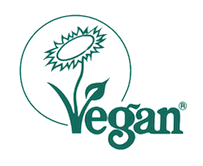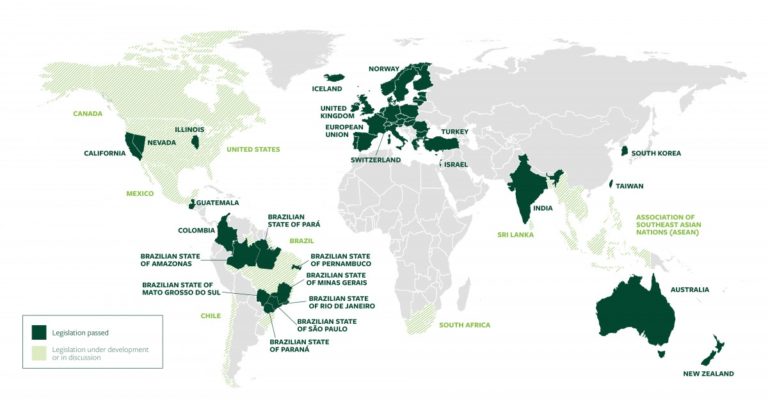Here are some of the reasons why vegan cosmetics are better for the planet, followed by a quick round-up of certifications to look for when buying vegan cosmetics.
Table of Contents
Most of us who buy vegan cosmetics do so to avoid animal-derived products and cruelty to animals, but did you know that there are also environmental benefits to going cruelty-free?
1. Fewer synthetic chemicals
Most vegan cosmetics are made with natural ingredients and fewer synthetic chemicals than standard cosmetics. This is better for the environment as it means fewer potentially toxic chemicals are released into waterways, soils, and the air. It also means fewer fossil fuels being used to produce these chemicals, both in the form of raw materials and energy.
Why is this the case for vegan cosmetics? Partly, this is a result of consumer demand. Many people choose veganism as part of a wider push for a more natural way of life, favoring whole foods and natural fibers instead of processed foods and synthetics.
In addition, regulators in most countries almost always require that synthetic chemicals undergo animal testing prior to approval for use in cosmetics. Avoiding these unnecessary chemicals in the first place means no need to subject lab animals to painful experiments.
2. Animal testing is cruel
The Humane Society Australia estimates that “globally, around 500,000 animals suffer and die just for cosmetics each year.” This is not only cruel, but it is also very wasteful and entirely unnecessary. Waste takes many forms: animal excrement, run-off from testing, animal corpses, and waste associated with the food needed to feed lab animals.
“We estimate that globally around 500,000 animals suffer and die just for cosmetics each year.”
The Humane Society International – Australia
Regulators may also label as medical waste the dead bodies of rabbits, mice, guinea pigs, and other lab animals exposed to toxic chemicals. This might require incineration, which is energy-intensive. Otherwise, poisoned animals may release toxins into the environment if improperly buried or discarded.
Interestingly, more lax environmental standards may apply to labs that perform animal testing. This is because they’re deemed to be carrying out essential work for public safety. Obviously, it wouldn’t be essential if companies didn’t insist on using potentially harmful chemicals in their cosmetic formulas.
3. Less likely to throw away
Despite all that testing, cosmetics that contain a raft of synthetic chemicals are still more likely to cause skin irritation or other issues compared to natural, vegan cosmetics. Typically, you can’t donate or give away partly used cosmetics, because of hygiene and safety concerns. Instead, most products that don’t meet a consumer’s needs are just thrown away.
This means that all the energy and resources that went into the original product are wasted, with yet more energy and resources used to create a replacement product, vegan or otherwise.
With more and more vegan cosmetics companies offering their products in refillable containers, the amount of waste continues to drop further.
4. Don’t promote deforestation
Non-vegan cosmetics can contain a slew of animal-derived ingredients, from milk products to animal fats, to honey and royal jelly. These sometimes come from grazing animals such as cows and sheep. And where do those animals graze? Often in areas that have been subject to deforestation, which is both horribly destructive to the ecosystem and a major contributor to greenhouse gas emissions and climate change.
Cosmetics often contain a long list of chemicals derived from animals. A few include:
- Casein (sometimes listed as sodium caseinate or caseinate)
- Lanolin
- Glycerine
- Elastin
- Oleic acid (sometimes listed as oleyl stearate, oleyl oleate or tallow)
- Stearic Acid
- Keratin.
In some cases, these chemicals can be plant-derived, such as vegetable glycerin and oleic acid from soy, corn, or palm oil. These can also be a cause of deforestation, however, so it’s always a good idea to check the source of ingredients and try to choose those least disruptive to the planet’s ecosystems.
5. Better for bees
Bee-derived products are quite common in cosmetics, even ones erroneously labeled as vegan. The trouble is that these ingredients are not typically sourced sustainably. In the case of bee products, this means from apiarists who care for bees as part of a well-managed ecosystem. Instead, bee products often come from commercial hives where bees are worked to death and their honey is stolen and substituted for cheap sugar water that lacks nutrition.
Without bees (and other pollinators), many of our food crops wouldn’t fruit. Farmers would no longer be able to grow a whole host of fruits and vegetables at large scale or cheaply. Many people would become malnourished or just go hungry if we didn’t have enough bees and other pollinators.
If you like blueberries and cherries, then, perhaps choose a similarly flavored lip balm without the beeswax. These fruits rely on honeybees for up to 90 percent of pollination!
Other bee-derived ingredients to look out for include royal jelly, propolis, and honey.
Vegan cosmetic certifications
It is easier than ever these days to find vegan cosmetics. Many companies proudly proclaim that their products are vegan, with some using a green V symbol with a little leaf attached and others using standard logos from certifying bodies like the Vegan Society.

The Vegan Society trademark sunflower symbol is one of, if not the best, certification to show that a product is truly vegan and cruelty-free. To qualify for this symbol, a product must not:
- Contain animal products
- Have used animal products in the manufacture or processing of the end product
- Contain genetically modified organisms (GMO) that have involved animal genes or substances that have derived from animals
- Be prepared in the same place as non-vegan products
- Be tested on animals or have its ingredients tested on animals on behalf of the company making said product.
Almost all ingredients, especially synthetic, have been tested on animals at some point. A truly vegan manufacturer would struggle to find any ingredients that have never been tested on animals by someone else.
Bear in mind that PETA-approved cosmetics are often, but not always vegan. The same goes for Leaping Bunny-certified cosmetics. While typically vegan, these cosmetics may simply be free from animal testing but could still contain animal-derived ingredients such as milk products, honey, carmine and shellac (from insects), and animal fats.


The Leaping Bunny program came about in 1996 to promote consumer awareness of animal testing. In order for a product to be certified by Leaping Bunny, the company making it must not conduct, commission, or be a part of animal testing for its formulations or ingredients therein. This certification doesn’t preclude a product from containing animal-derived ingredients, however.
Are all vegan cosmetics cruelty-free?
- Confusingly, not all cosmetics labeled as cruelty-free are vegan.
- What’s more, not all ‘vegan’ cosmetics are cruelty-free.
- Many cosmetics free from animal-derived ingredients still contain ingredients that have been tested on animals.
- In every case, this testing is totally unnecessary. Companies could easily substitute unapproved ingredients for ingredients that have already been approved as safe.
Why does this labeling confusion arise? For the most part it is because companies making cosmetics decide to self-certify them as vegan based only on the absence of animal-derived ingredients. Veganism is not just about the final ingredients in something, however. The broader vegan ethos encompasses doing no harm to animals, meaning vegan cosmetics should also be cruelty-free. To qualify for Vegan Society status, for instance, all cosmetics must be both vegan and cruelty-free.
Final thoughts
In some cases, otherwise vegan cosmetics companies may choose to subject their formulas and ingredients to animal testing. Why? Because this is sometimes necessary to meet strict requirements for sale in certain countries, such as China. Other companies decide against selling their products in those countries, so they can say for sure that their products are vegan and cruelty-free, with no animal testing at all.
#BeCrueltyFree is a leading global campaign to end animal testing for cosmetics. Humane Society International launched the campaign in 2012 to help raise awareness and promote bans on animal testing and trade. Since, the European Union, Australia, Israel, Norway, India, and Switzerland have adopted such bans.

Note that the United States is not in this list, and nor is the UK now that it is no longer a member of the European Union. However, California, has passed laws to ban or limit cosmetic animal testing. So too have Guatemala, New Zealand, South Korea, Taiwan, Turkey, and several states in Brazil.
Whether or not you’re vegan, choosing vegan cosmetics is better for the environment and likely better for your skin, in addition to being better for animals.
This doesn’t mean throwing out all the cosmetics you currently own and starting afresh. That would be wasteful indeed! Instead, make a point when replacing cosmetics to look for those labeled as both vegan and certified cruelty-free, especially if buying products made in the US. And, if you can, consider purchasing products labeled as vegan by the Vegan Society, or your country’s equivalent.